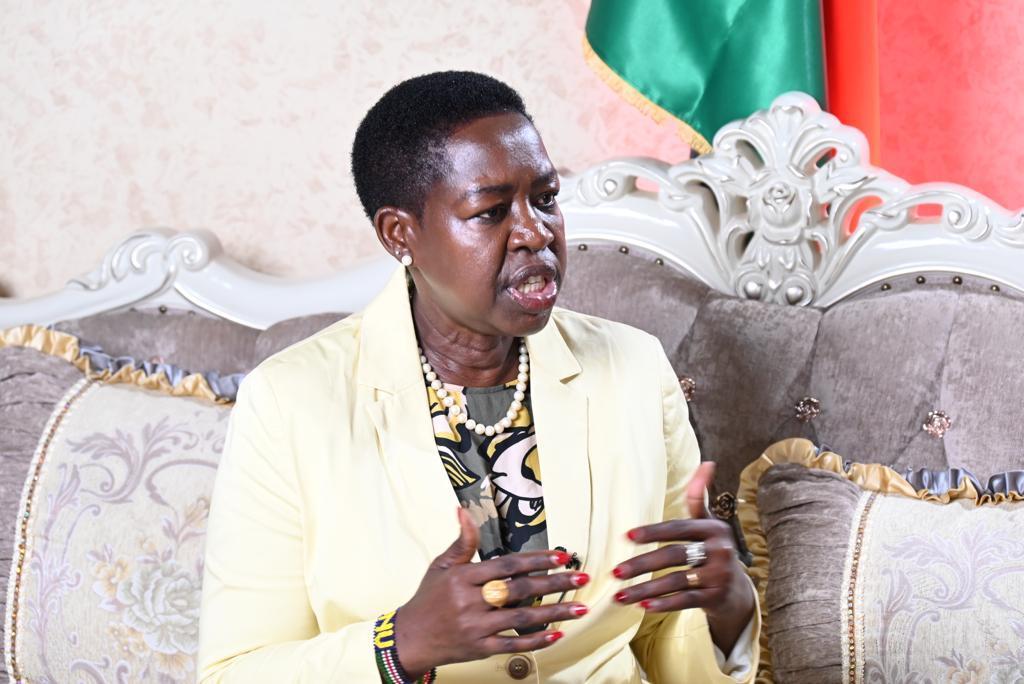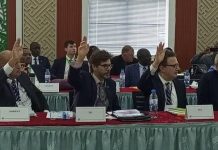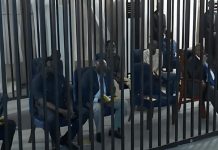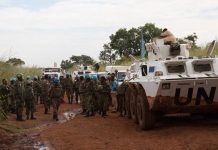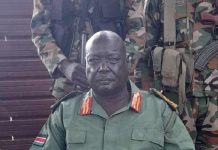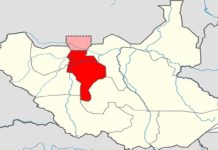Prince Favour
Africa-Press – South-Sudan. The Revitalized Transitional National Legislative Assembly was reconstituted in 2021 as per the agreement on the resolution of the conflict in the Republic of South Sudan.
Membership of the National Legislative Assembly was then expanded from 400 to 550, with SPLM-IG bagging 332 seats, SPLM-IO getting 128 seats, Other Political Parties (OPP) bagging 30 seats, and Former Detainees walking away with 10.
We now look back two years since the Transitional National Legislative Assembly was reconstituted and picture the strides that have been made and what still remains unfinished.
To unpack, I sat down with the speaker of the National Legislative Assembly, Jemma Nunu Kumba for an extensive and in-depth conversation.
Favour: Madam Speaker, Thank you for honouring this interview. Let us with the most fundamental things. What is the role of the National Legislative Assembly?
Speaker : The role of parliament is clear; one is the enactment of laws. In our laws, private member bills are also allowed, and this is where any member can initiate a bill and bring it for enactment. Its second mandate is an oversight role, checking on the executive in terms of their functions to see whether the laws enacted by parliament are being implemented. The Parliament oversees the work of the executive in terms of service delivery and is able to question the ministers if things are not going well.
Parliament also plays an important role in parliamentary diplomacy, engaging with other parliaments in the region and globally to be part of the global efforts of parliaments to address global issues such as environmental issues, conflicts, and others. These are the three key mandates of the parliament.
Favour: What are the roles of parliamentarians?
Speaker: The main mandate of this parliament is to oversee the implementation of the peace agreement. The people expect their members to raise issues that affect them, such as insecurity, gender-based violence, inflation, and the low salaries of civil servants. These are the issues people expect their representatives in parliament to talk about.
As parliament, we have called the ministers and executive to respond to some of these queries.
Favour: What progress has the parliament made, two years down line?
Speaker: As a transitional parliament that manages the transitional period and the revitalised peace agreement, the main focus of this parliament is to oversee the implementation of the agreement. We have made several amendments to the constitutions, all security laws were reviewed and amended, namely: the SSPDF Act, National Police Service Act, the National Police Act, Civil Defense, and the rest of the organized forces.
Important bills such as the Constitution Making Process Bill and the Political Parties Act were passed and signed into law by the president. We also ratified five protocols and conventions, including the Maputo Protocol, which the African Union and the international community were very much concerned about. We also made 60 resolutions, so passing all these bills and ratifying international conventions and protocols is an achievement.
We participated in the 12th East Africa parliamentary games in Arusha-Tanzania and also hosted the same games which brought together 1,000 people from member states of the East Africa Community.
The visitors show and prove for themselves that the situation in South Sudan is alright not as bad as is reported in the media.
We have made significant improvements in the infrastructure of the parliament, and we have put offices for security organs, a kitchen, and washrooms, we have a well-equipped restaurant for the members of parliament to serve and eat food in.
Office space was a challenge. Consequently, we have built a complex containing 32 conducive and spacious office spaces for the 32 specialized standing committees of the parliament. The expansion work on the parliament building is progressing, but it will still not be enough to accommodate both houses—the National Assembly and Council of states—as a result we are putting up an extra temporary hall within the same premises in the western side for that purpose.
We have also been visible in the regional and international arenas, including the East African Community Legislative Assembly. We recently elected nine members in a fair, transparent, and credible elections to represent South Sudan in this regional parliament.
Favour: Who is funding these parliamentary infrastructural development and what is the cost estimate?
Speaker: I leave that to the administration because it is done in bits, so cumulatively the figure can be gotten from the administration. Recently, a section of the media quoted the clerk saying that the parliament’s gate alone was developed at a whopping cost of $5 million—this is completely misleading and wrong. Five million is an accumulative cost covering other developmental projects here in Parliament.
Favour: What is your assessment of implementation of the Revitalized peace agreement?
Speaker: Considerable progress has been made in the implementation of the peace agreement, including the training and graduation of the first batch of the necessary unified forces. However, they have not been deployed because of the challenges of the arms embargo, which has reduced the capability of the government to procure arms for these forces.
This, as we hear from the executive, is a big challenge. The government is expected to provide security in the country, but how do you execute this mandate without arms? So we have always appealed in all our interactions with the international community to look into this and grant a special considerations for the necessary unified forces to be equipped and deployed.
Favour: What is your assessment of the implementation of the revitalized peace agreement?
Speaker: Of course the pace is a bit slow because of the challenges I enumerated. If anything is to be done, we need to expedite the implementation of the provisions in the agreement especially those highlighted in the roadmap. Our president has made it very clear that elections have to take place at the end of the transitional period but before that certain processes has to take place. However, the experts know what options are available in case census is not conducted and most important is the permanent constitution making process.
Favour: What is your take on the representation of women in the government? Has it met the 35% quota?
Speaker: In the executive, we have only one female governor as opposed to three as stipulated in the agreement, so yes, we have some women in the executive but not exactly 35 per cent. We fell short of some percentage. Here in the national parliament, I made sure the heads of specialized standing committees, were balanced.
From the side of SPLM and SPLM-IO the 35 per cent quota has been achieved for women in the leadership here in parliament. Our challenge was with other parties, including the National Agenda, Other Political parties, and South Sudan Opposition Movement Alliance, This delayed the establishment of the leadership of parliament, but SSOA and OPP managed to submit their female nominees. National Agenda failed to present their nominee, so we moved on with the leadership setup in parliament.
For example, in the SPLM, we have 17 positions for deputy chairpersons of the standing committees, out of which eleven are women.
Favour: What challenges do you face as a female leader and what steps have you taken to overcome?
Speaker: There are several challenges. In post-war governance, many people are frustrated when they don’t get their interest, they turn it against you.
Our society is yet to accept the issue of gender equity. You would expect this with any other woman leader across the globe, example, belittling my work, this is not happening because of the speaker.
These are male chauvinistic attitudes against a female leader. Some feel this is not the time for women to be in leadership, the majority of the men and women in parliament support my leadership.
I don’t really mind about that, my advice to the male counterparts is to respect women in leadership, just as women do the same for men in leadership.
Favour: As we wrap-up, could you convey your peace message to South Sudanese?
Speaker: I am always for peace, I talk about peace because there is nothing you can do without it. We can have beautiful programs and dreams on paper but without peace, you can do nothing.
My message to South Sudanese is we have been through war and its consequences so we are better placed now to make informed decision on how we want to move forward as people, knowing what war can do and what peace can do.
The right decision is to take the direction of peace so that all these suffering we are going through can come to pass when there is peace,
I commend the parties to the peace agreement because they are working together for peace. They should continue in the same spirit of cooperation and unity am happy the group of Gen. Johnson Olony is already here, let us join hands with our president to implement the peace agreement, talk to our people if there is anything disturbing let us talk about it without necessarily going for guns, guns kill and destroy.
Given our experience, we should be the best to advise our friends in the region about the dangers of war. If we can talk before taking guns to solve problems that is better. Let us always give dialogue a chance, let us forgive each other and open a new chapter to move forward and get our country on track for prosperity.
Favour: Thank you very much Rt.Hon. Speaker talking to us.
Speaker: You are welcome and thank you too.
Source: The City Review South Sudan
For More News And Analysis About South-Sudan Follow Africa-Press

